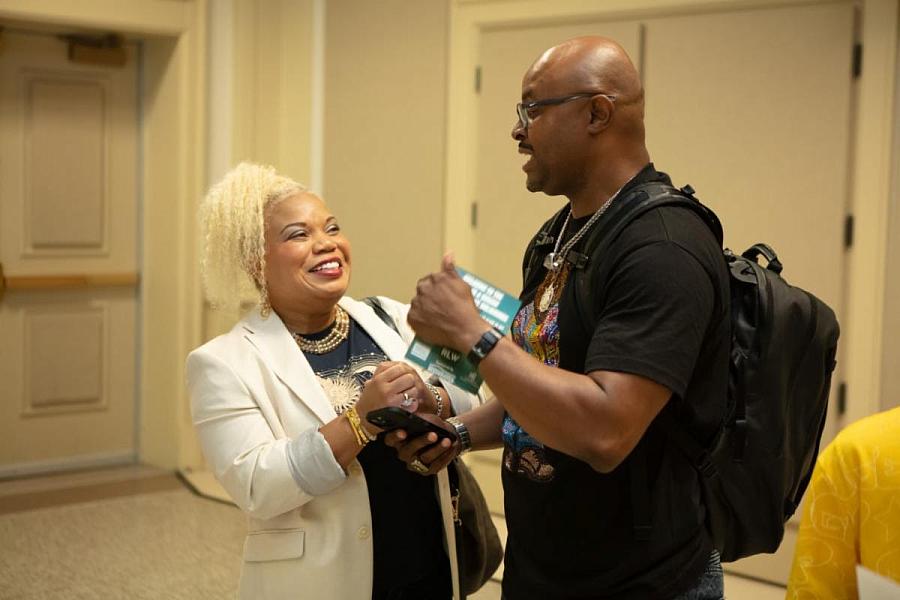The Health Divide: There’s a difference between mental health and mental wellness

Dr. Lia Knox, founder of Knox Behavioral Health Solutions, recently urged clinicians to drop the phrase “mental health” and replace it with “mental wellness.” There’s a lesson there for journalists, too.
(Photo via James Causey)
Editor's Note: The vast gulf in opportunities for living a healthy life and finding health care when you need it have been core themes of the Center for Health Journalism from our inception. The starkly unequal toll of the pandemic and the widespread protests that followed reemphasized the way in which racism continues to corrode health and foreshorten lives. And they gave fresh urgency to our work of examining these issues through a journalistic lens. This week, we’re launching a new newsletter, anchored by veteran journalist James Causey of the Milwaukee Journal Sentinel, that explores health inequities in the broadest sense — from the language we use to talk about mental health to the stories we keep missing in our midst, despite the fresh focus on race and equity in newsrooms across the country. We hope you’ll follow along, and we welcome your feedback.
As journalists we know the importance of words and language.
They can be used to hurt. Or to heal. Words can give hope or shatter the core of someone’s dreams.
“Tough it out!”
“It’s not that bad!”
“Stop acting so fragile!”
Have you ever been told anything similar or said words like these to anyone else?
In the words of Mark Twain: “The difference between the right word and the almost right word is the difference between lightning and the lightning bug.”
One of the hardest topics to write about is mental health because there is still a lot of outdated language that slips past copy editors and ends up in print.
When it comes to building trust in underserved communities, using outdated and offensive language can tarnish all the good you are trying to do.
In March, I moderated a panel on “Mental Health in the Black Community,” at Marquette University. The goal of the event was to get African American counselors and clinicians to share their experiences with white professionals so they can be better informed when working with people of color.
There is a shortage of Black and Hispanic mental health professionals, and this presents a barrier to treatment for communities of color. The lack of minority therapists makes it harder for people of color to find a practitioner that they feel comfortable opening up to.
Dr. Lia Knox, one of the Black panelists and the founder and CEO of Knox Behavioral Health Solutions, challenged clinicians to drop the phrase “mental health” and replace it with “mental wellness.”
“Because when we talk about mental wellness it is not from a deficit. It is from a positive,” she said.
When you say mental health, for many people of color, and African Americans in particular, the stigma and judgement prevent them from seeking treatment.
As a Black man living and working in the inner city, I have come across many who continue to suffer in silence because of the stigma of being labeled as “crazy,” “psycho,” and maybe the worst term, “nuts.” It’s language I hear daily.
When I come across a phase or word that doesn’t feel right, I usually run it past a colleague to see if they also feel triggered. It’s best to follow your first instinct. When it’s in a quote, I typically won’t use it. Find another quote or paraphrase. My goal is not to bring more harm, and using outdated language doesn’t move the conversation forward.
I’ve also noticed as soon as you mention mental health or mental illness to a Black person or suggest that they need counseling, the first thing out of their mouth is “I’m not crazy.”
“But as soon as you talk about mental wellness, you know you have a right to feel good. I have a right to feel well today,” Knox said.
Knox said she coined the “mental wellness” phrase nearly two decades ago and she noticed how her clients embraced it, because it shifts the focus toward a more positive and empowering approach.
I much prefer the term mental wellness, as a person who has had some struggles with my own mental health after I lost my parents. I felt like I could not show my true emotions. When people asked me how I was doing, I would just say fine or ok, because I didn’t want people thinking I was crazy.
That’s a bad feeling and an alone feeling. You feel like you are working from a deficit. When you are working on your mental wellness, and let’s face it, most of us are at one time or another, it gives you the power to know that you have more control.
There are other shifts in language that I see colleagues using. One big shift is moving from “homeless” to “unhoused.” In my newsroom, we have not made a policy shift to mental wellness, but I have been using it, because I do have more freedom as a columnist. I’m sure it’s something reporters and editors will have conversations around soon.
What do you think? Will you start using mental wellness now in your reporting and stories? Let me know.
James E. Causey is a reporter for the Milwaukee Journal Sentinel. He started reporting on life in his city while still at Marshall High School through a Milwaukee Sentinel internship. He's been covering his hometown ever since, writing and editing news stories, projects and opinion pieces on urban youth, mental health, employment, housing, and incarceration. Causey was a fellow at the USC Center for Health Journalism in 2018 and served as a senior fellow in 2021 and 2022. He was a Nieman Fellow at Harvard University in 2007.
